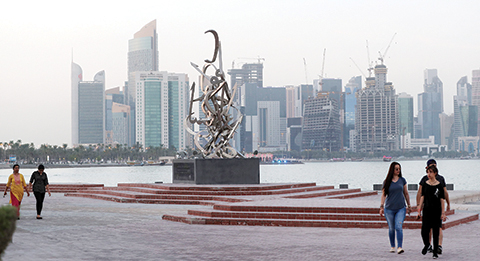 People walk on the corniche of the Qatari capital Doha on July 2, 2017. - AFP
People walk on the corniche of the Qatari capital Doha on July 2, 2017. - AFP DOHA: Qatar has moved closer to granting permanent residency to foreigners after its senior legislative body approved a draft law, first announced in the wake of the ongoing Gulf crisis. State media reported the Shura Council agreed on Monday to back a law which would grant residency to expatriates who provide valuable services as well as to the children of Qatari women married to non-Qataris. "The Advisory (Shura) Council approved a draft law on permanent residency," the Qatar News Agency reported. Permanent residents would be allowed to have free state education, healthcare and be given the right to own property. It is thought to be the first such law proposed by one of the energy-rich Gulf states.
It was first announced last August just two months after Qatar was boycotted by neighboring former allies in a bitter diplomatic dispute. Like other nations in the region, Qatar relies massively on foreign labor. Its current population of 2.71 million, a record, is made up of almost 90 per cent non-nationals, many helping the country prepare to host the 2022 World Cup. There are some 315,000 Qatari nationals. The residency proposal will now be considered by Qatar's cabinet and Amir Sheikh Tamim Bin Hamad Al-Thani before it becomes law.
Few days ago, the United Arab Emirates announced plans to allow 100 percent ownership and visa incentives to foreigners, in a bid to attract investors to boost its slowing national economy. The decision, taken by the UAE cabinet, aims to lure "international investments and exceptional talent", according to Dubai ruler Sheikh Mohammed Bin Rashed Al-Maktoum. The new measures come amid signs of an economic slowdown in the oil-rich Gulf state is on the back of lower oil prices, with reports showing the vital real estate and tourism sectors of Dubai struggling. The decision will allow foreign investors 100 percent ownership of companies, coupled with 10-year residence permits for them and their families, according to a cabinet statement cited by WAM news agency. The measures will come into force by the end of 2018, the statement said. The UAE leads all Arab countries in terms of foreign direct investment, attracting $11 billion last year-a jump of 22 percent on 2016 - according to the International Institute of Finance.
Although it is the most diversified and open economy in the Middle East, foreigners can only own up to 49 percent of companies unless they are established in special free trade zones. The new measures also grant 10-year long residence permits to professionals in the medicine, science, research and technical fields. Like other energy-rich Gulf Cooperation Council (GCC) states, foreigners working in the UAE must have their residence permits made by a national sponsor known as kafeel. The International Monetary Fund earlier projected that UAE economic growth would fall from 3.0 percent in 2016 to 1.3 percent in 2017.- Agencies









